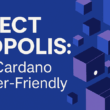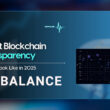Spectrum is building a platform for natively cross-chain dapps based on a decentralised consensus protocol. Currently, there is no direct access to the liquidity of other blockchains for dapps, nor a decentralised way to transfer liquidity across different DeFi protocols. The only tools available are Centralised Exchanges (CEX). Specturm proposes to build the platform that solves these issues.
Defi market challenges
There are classical DeFi applications in place to offer some features and decentralization such as Uniswap. However, these applications are faced with challenges such as poor user experience and poor capital efficiency. Another solution available in the market is cross-chain decentralised finance, aiming to solve issues in protocols such as Uniswap. Rather than committing to a solid single Layer 1 blockchain. These cross-chain solutions abstract across several Layer 1 networks with a focus on interoperability and cross chain liquidity aggregation.
However, true cross-chain DeFi is impossible without a solid Layer 2 solution allowing developers and users to offload the burden of expensive transaction validation from Layer 1 blockchains and validate cross-chain transactions faster and cheaper.
The challenges experienced by the cross-chain solution can be solved by introduction on an interoperability layer, allowing data to be transferred among multiple blockchains. There are currently two solutions in the market: Trusted Oracle and semi-centralised oracle network. However, both of these are faced with challenges. For instance, the trusted oracles are centralised, providing fast and cheap transaction but lacking decentralization. Centralised oracles do not offer sustainability, censor transactions and can send inaccurate data.
The Spectrum.Network solution
Spectrum moves beyond the idea of cross-chain data bridges and implements a decentralized protocol for cross-chain computations. This assumes not only the transfer of data among heterogeneous blockchains but also computations on this data, just like smart-contracts on regular Layer 1 blockchains but with access to multiple blockchains at once.
Spectrum.Network operates under an optimized Roll-dPoS consensus protocol, which was used in IoT-oriented blockchains such as where nodes are IoT devices, so the protocol is designed to support a large number of participants.
Spectrum has seen a lot of development and evolution through Project Catalyst funds, contributing to the existing evaluation of Roll-dPoS by introducing CoSi, an efficient protocol for collecting signing. Spectrum will allow quicker and cheaper transactions, have cross-chain liquidity and interoperability out of the box and open the door for more sophisticated DeFi protocols such as Decentralized Lending or Option Vaults,
The Team
The spectrum team consists of 5 core members and 2 ErgoDEX founders. The ErgoDEX founders are Ilya Oskin, Co-CEO and CTO and Yasha Black, Co-CEO and CPO.
The other team members are; Timofey Gusev and Alexander Romanovsky as Senior Core/Smart Contract developers, Ruslan Salakhov and Sargey Koshechkin as frontend lead developers, and Gulnara Nigmatzyanova as the senior QA engineer.
The core team members have worked as a team in ERGODEX before, developing smart contracts, bots, off-chain services as well as current version of ErgoDEX user interface. Each one has several years’ experience in the blockchain community.
Budget
Spectrum is asking for $ 312,000 to be spent within 6 months of development time. The amount will be distributed in the following manner:
- Lead Rust developer – 1 individual – $10,000/month
- Senior Rust developer – 3 individuals – 3 * $8,000/month = $24,000/month
- Senior Blockchain Researcher – 1 individual – $8,000/month
- Senior QA engineer – 1 individual – $5,000/month
- Tech manager – 1 individual – $5,000/month
The cost of paying the team per month will amount to $52,000, which translates to $312,000 for the projected period of 6 months.
Final Thoughts
Spectrum has created a detailed plan and explanation of the current challenges, solutions and shortcomings in the market to allow Project Catalyst members to have a clear understanding for the need of its solution. Through the detailed data, it is clear what the project will offer, and how Cardano users will benefit.
Spectrum seeks to offer more than what is currently available, by providing a decentralised consensus protocol that goes beyond the idea of cross-chain data bridges. Through this solution, Spectrum opens the door for more sophisticated DeFi protocols such as Decentralized Lending or Option Vaults, which are impractical to build on top of many Layer 1 blockchains due to current design limitations.
Image courtesy of pixabay










